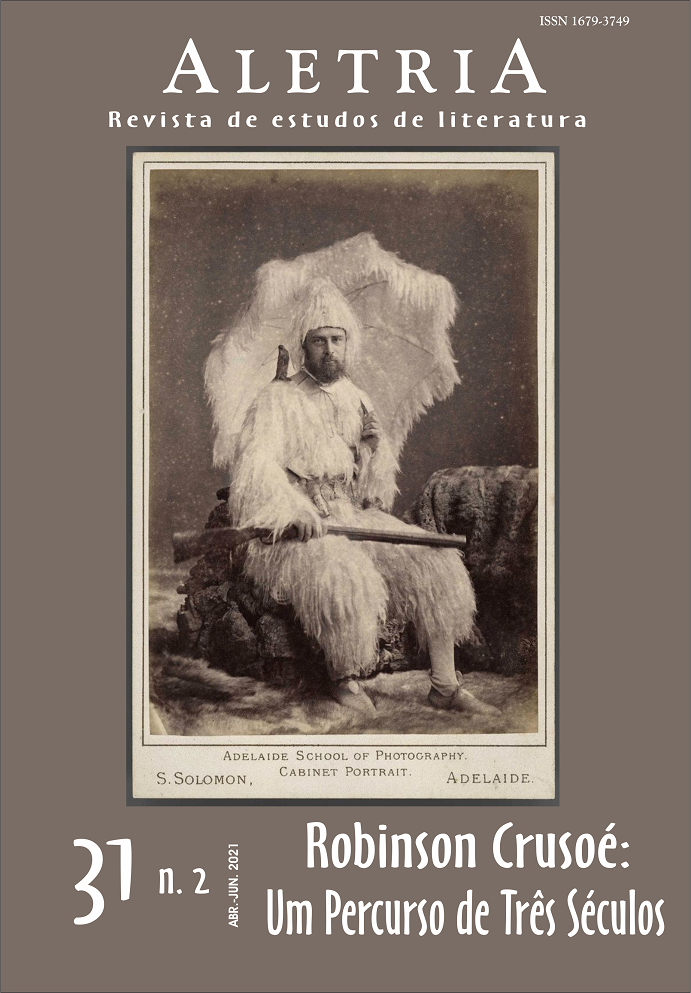A Poetics Shipwreck
The Witness of Juan José Saer
DOI:
https://doi.org/10.35699/2317-2096.2021.24907Keywords:
Saer, robinsonade, journey , shipwreck , ColastineAbstract
Writer from Santa Fe, Juan Jose Saer (1937l-2005), offers us in his novel, The Witness (2000), a journey in search of the origins of and adventure, not only of the “sea hungry” teenage cabin boy, but also that of which reveals the intimate question of the human being and his Latin-American origin. Saer revisits a long narrative tradition in which the castaway’s image reappears, to bond it with the loss of sense, the precariousness of the world we inhabit, the incompleteness of a language which we think we dominate but drifts in the uncertain. The expressions, representations and the purpose of the tale The Witness, advocate for the fundamentals for a “real” adventure, which materiality lies in the word itself. As a foundational gesture, this “poetic castaway” enunciates the trajectory of an auto-reflexive journey, relative to cause, the effect and presence of a man who describes and invents the entelechy of his ideal life, in regards to the castaway incited by Defoe’s work.
Downloads
References
AGAMBEN, Giorgio. Infancia e historia. Traducción de Silvio Mattoni. Buenos Aires: Adriana Hidalgo, 2011.
BADA, Ricardo. Trescientos años de Robinson Crusoe. La columna de Ricardo Bada. Carta de Alemania (44). Disponible en: https://pda.auroraboreal.net/actualidad/fotoreportaje/2770-carta-de-alemania-44. Consultado en: 5 mayo 2020.
BASTOS, María Luisa. Eficacias de lo verosímil no realista: dos novelas recientes de Juan José Saer. La Torre, Puerto Rico, v. 4, n.13, p. 1-20, 1990.
BERG, Edgardo. La problematización de la lengua en “El entenado” de Juan José Saer. Cuadernos para Investigación de la Literatura Hispánica, La Rioja, n. 19, p. 251-254, 1994. Disponible en: https://dialnet.unirioja.es/servlet/articulo?codigo=31985. Consultado en: 8 mayo 2020.
CABO ASEGUINOLAZA, Fernando. Infancia y modernidad literaria. Madrid: Biblioteca Nueva, 2001.
CALDERÓN, Tatiana. Problemática de la alteridad en Robinson Crusoe de D. Defoe y “Adiós Robinson” de Julo Cortázar. Revista Iberoamericana, Pittsburgh, PA, v. LXXIX, n. 244-245, p. 843-862, jul.-dic., 2013. DOI: https://doi.org/10.5195/reviberoamer.2013.7125
CERTEAU, Michel. La debilidad de creer. Traducción de Víctor Goldstein. Cd. de México: Katz, 2006.
FAÚNDEZ, Pablo Morán. La Focalización en Robinson Crusoe (1719) de Daniel Defoe. La visión sobre el indígena. Disponible en: http://repositorio.uchile.cl/bitstream/handle/2250/110452/faundez_pa.pdf?sequence=3&isAllowed=y. Consultado en: 30 jun. 2020.
FILINICH, María Isabel. Enunciación. Buenos Aires: Eudeba, 2005.
FUENTES, Carlos. Valiente nuevo mundo. Cidade de México: FCE., 1990.
GARRAMUÑO, Florencia. Genealogías culturales. Argentina, Brasil y Uruguay en la novela contemporánea. Rosario: Beatriz Viterbo, 1997.
GONZÁLEZ, Horacio. Entrevista a J.J. Saer. En: PONCE, Javier. J.J. Saer, lenguaje y memoria. El Universo, 2005, Guayaquil. Disponible en: https://www.eluniverso.com/2005/08/21/0001/984/D1CCFB30D84E4AA08FDF79952DA95DF7.html. Consultado en: 5 jun. 2020.
GRILLO, Rosa María. Francisco del Puerto, Aguilar y Guerrero, tres náufragos entre la palabra y el silencio. América sin Nombre, Alicante, n. 9-10. p. 98-108, 2007. DOI: https://doi.org/10.14198/amesn2007.9-10.14
GUSDORF, Georges. Condiciones y límites de la autobiografía. En: LEJEUNE, et al. La autobiografía y sus problemas teóricos. Traducción de Ángel G. Loureiro. Barcelona: Anthropos, 1991.
HERODOTO. Los nueve libros de la Historia. Traducción de P. Bartolomé Pou. Cidade de México: Porrúa, 1986.
JÁUREGUI, Carlos. Canibalia. Canibalismo, canibalismo, antropofagia cultural y consumo en América Latina. Disponible en: https://www.academia.edu/7024504/Jauregui_Canibalia_Canibalismo_calibanismo_antropofagia_cultural_y_consumo_en_America_Latina_Introduccion_. Consultado en: 5 jun. 2020.
O’GORMAN, Edmundo. La invención de América. Cd. de México: FCE, 1998.
PONS, María Cristina. Memorias del olvido. La novela histórica de fines del siglo XXI. Cd. de México: Siglo XXI, 1996.
ONFRAY, Michel. Teoría del viaje. Poética de la geografía. Traducción de J.R. Azaola. Barcelona: Taurus, 2016.
PREMAT, Julio. La dicha de Saturno. Rosario: Beatriz Viterbo, 2002.
RICŒUR, Paul. Teoría de la interpretación. Traducción de G. Monges N. Cd. de México: Siglo XXI, 1998.
SAER, Juan José. Una literatura sin atributos. Cd. de México: UIA, 1996.
SAER, Juan José. El Entenado. Bs.As.: Seix Barral, 1999.
STEELE, Richard. The life and adventures of Alexander Selkink, the real Robinson Crusoe. A narrative founded on facts, NY. Day & Co., impreso por James Egbert, 1841. Disponible en: www.forgottenbooks.com. Consultado en: 5 jun. 2020.
Downloads
Published
How to Cite
Issue
Section
License
Copyright (c) 2021 María Esther Castillo-García (Autor)

This work is licensed under a Creative Commons Attribution 4.0 International License.
Authors who publish with this journal agree to the following terms:Authors retain copyright and grant the journal right of first publication with the work simultaneously licensed under a Creative Commons Attribution Non-Commercial No Derivatives License that allows others to share the work with an acknowledgement of the work's authorship and initial publication in this journal.Authors are able to enter into separate, additional contractual arrangements for the non-exclusive distribution of the journal's published version of the work (e.g., post it to an institutional repository or publish it in a book), with an acknowledgement of its initial publication in this journal.Authors are permitted and encouraged to post their work online (e.g., in institutional repositories or on their website) prior to and during the submission process, as it can lead to productive exchanges, as well as earlier and greater citation of published work (See The Effect of Open Access).





